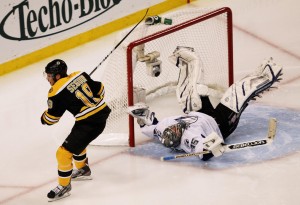
Tyler Seguin scores during Tuesday night's 6-5 Bruins win over the Tampa Bay Lightning. (Photo: NHL.com)
Tuesday evening, Boston Bruins rookie Tyler Seguin put on a clinic against the Tampa Bay Lightning, scoring two goals, two assists, and showing flashy skill and playmaking abilities that made even the least enthusiastic of hockey fans stand up and cheer. Seguin had been benched for the playoff run up to Game 1 of the Eastern Conference Finals, where he was inserted in the place of an injured Patrice Bergeron. Bruins coach Claude Julien had been noncommittal towards playing his 2010 #1 draft pick in the playoffs, and had used him sparingly as the regular season drew to a close.
When Seguin finally saw playoff ice, he broke out, showing the abilities that made him so highly coveted last year. However, what motivated that after a so-so rookie season where his experienced coach who didn’t feel he was ready to play postseason hockey?
There are always people who rise to the opportunity – who need just a bit more motivation or a bit more sense of occasion to show what they can do. To us non-athletes, they were those kids in school who wouldn’t do their everyday homework, didn’t pick up a review book, but still got a perfect score on the SATs.
Needing a reason to be dynamic can sometimes be viewed as a sign of immaturity. You don’t yet see the reason why you should put your nose down to the grindstone everyday, but when you view it as important, when you know a lot of people will be watching, you turn it on. Maybe it’s not so much immaturity always, but inexperience – when you aren’t used to showing your best every single day, it can be difficult to get into that groove when it’s called upon.
Where have I seen this most? When hockey players make the jump from high school/prep school/juniors to college hockey. It’s easier to be a big fish in a small pond, which admittedly most college hockey players are at the team they play on immediately before college. (I mean, it’s why they got a D1 scholarship and their linemate riding pine didn’t.) Once they join their college team, they either make the realization that they are going to have to give a stronger effort right away, or it may take them a while.
The two biggest examples of this I’ve watched are Colin Wilson and Charlie Coyle when they joined Boston University. Both were greatly talented coming into college, and then had wildly inconsistent freshman years. You saw them play up when they needed to, but in an average game against a basement dweller opponent, they didn’t make the plays they could have right away. Coyle played up for the World Juniors, then slid in production when he came back to BU after that tournament. When you’re young, opportunities need to be more obvious to you. It’s hard for any 18 year old to sense the need to play up for UMass Lowell, when a month ago you were playing the Canadian national team. In Wilson’s case, he seemed distracted during several games his freshman year, and then started giving a more consistent effort as the season went on and the team needed to dig themselves out of a hole standings wise. Wilson sensed the occasion, and that’s when he started to produce.
The Bruins’ Seguin is probably stuck in a similar situation. In the OHL, he was top banana, but the NHL is a new league and situation for him. How do you balance going full tilt in practice everyday against guys with years more experience than you? How do you play at the same intensity level for both a game against the woeful Ottawa Senators and then the arch-rival Philadelphia Flyers? How do you manage the idea internally that you have to consistently push yourself, and can’t have an off-day and still be the best player on your team? That’s a whole new mindset for an 18/19 year old, and no one is immune from struggling with new expectations.
That struggle is going to come across as laziness, lack of ability, and the sense that a player isn’t ready for prime-time. A NHL head coach, for better or worse, doesn’t have a degree in sports or adolescent psych. They aren’t going to take a rookie’s internal recalibration well, or at least they aren’t paid to.
What am I trying to say with this long ramble? While Seguin very well may have been playing to get back at his coach for sitting him all this time, it was most likely much more that in the ups and downs of being a teenage hockey player playing their first year on the next level, Seguin saw the occasion and played up. The reason to play full tilt was obvious, and in a year filled with learning new nuances (which your rookie year is), the obvious opportunities are few and far between. For one of the first times this year, there was a reason, there was a chance, and Seguin took it. And with a major reward at the end (last night’s win) that will be a building block to more consistent high level of performance down the road.